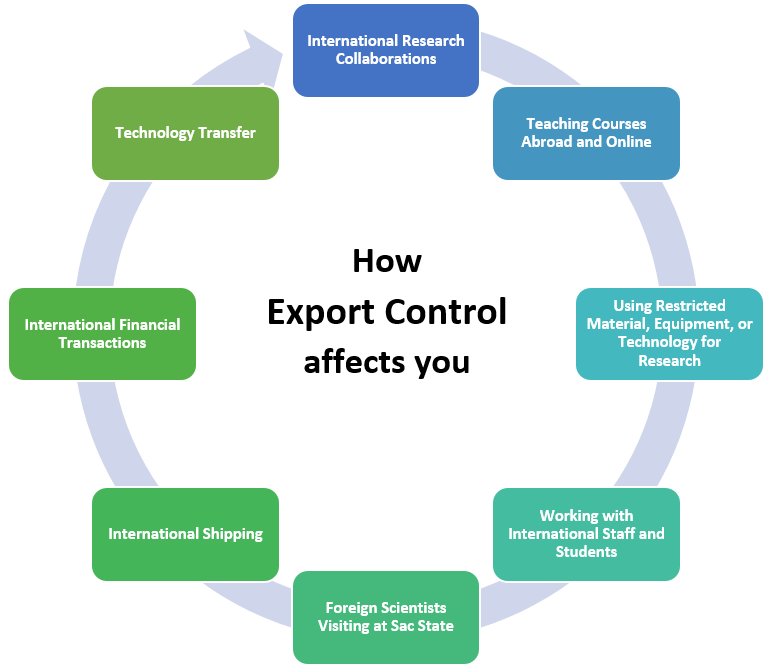Support Page Content
Export Controls
Export control laws are a set of federal regulations designed to protect U.S. national security, prevent the proliferation of weapons of mass destruction, further U.S. foreign policy including the support of international agreements, human rights and regional stability, and to maintain U.S. economic competitiveness.
Export controls govern how information, technologies, and commodities can be transmitted overseas to anyone, including U.S. citizens, or to foreign nationals in the U.S. These regulations are the International Traffic in Arms Regulation (ITAR), the Export Administration Regulation (EAR), and the Office of Foreign Assets Control (OFAC).

.
Consultation
If you plan to:
- Travel abroad for research or conference,
- Mail or carry university-equipment abroad,
- Communicate with a foreign national about non-fundamental research,
- Send controlled information to a foreign national or to someone from a sanctioned country,
- etc.
Please review the Export Control SharePoint site for guidance or email us for a consultation to ensure your activity is appropriately documented.
International Travel
Taking university-owned research equipment may require export control considerations and documentation. Please review this site for country-specific considerations.
Fundamental Research Exclusion
The Fundamental Research Exclusion (FRE) provides that technology (meaning “technical data”) or software that arises during, or results from, fundamental research and is intended to be published is excluded from the export control regulations. The exclusion does not extend to items that may be used during the course of fundamental research.
The exclusion for fundamental research from export controls applies to technical data only,
- When conducting fundamental research,
- With the intent to publish the results, AND
- You have accepted no publication/dissemination or access restrictions (i.e. your project is not subject to publication approval by sponsors or the government, nor have you accepted citizenship-based restrictions on who may be included on the research team).
University research will not be considered fundamental research if:
(i) The University or its researchers accept other restrictions on publication of scientific and technical information resulting from the project or activity, or
(ii) The research is funded by the U.S. Government and specific access and dissemination controls protecting information resulting from the research are applicable.”
Educational Information and Public Domain Exclusions
Educational Information
Educational information may be exported or “deemed” exported without an export license during instruction in courses regularly offered by universities. This exemption includes instruction in science, math and engineering concepts taught in courses listed in the university’s catalogue and associated teaching laboratories, even if the information concerns export controlled commodities or items.
Public Domain
Information that is published and generally accessible or available to the public through sales at bookstores or newsstands, subscriptions, libraries, patents available at any patent office, conferences, meetings, seminars or trade shows, or through fundamental research.
Other
There are also some special exceptions to the export license regulations. These include shipments of limited value, gifts and humanitarian donations.